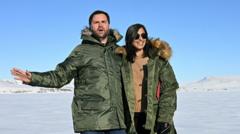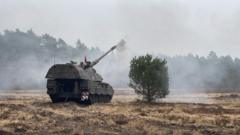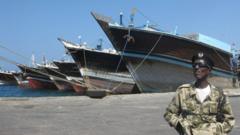**Vance's remarks highlight the geopolitical stakes in Greenland, raising questions about the island's future and its relationship with Denmark.**
**Vance Critiques Denmark During Arctic Visit to Greenland**

**Vance Critiques Denmark During Arctic Visit to Greenland**
**US Vice-President JD Vance calls for stronger US alliances as tensions rise over Greenland's security.**
In a recent visit to Greenland, US Vice-President JD Vance publicly criticized Denmark, claiming it has inadequately protected the Arctic territory from perceived threats posed by China and Russia. His remarks come amid growing concerns over foreign interest in Greenland's resources and strategic location. Vance encouraged the Greenlandic people to consider independence and suggested that they form a partnership with the United States for greater security.
Vance's critique of Denmark's commitments superimposes strained relations between Washington and Copenhagen, particularly in light of an overwhelming opposition to US takeover from the Greenlandic populace. Polls indicate a firm rejection of annexation among Greenlanders, with Greenland's Prime Minister expressing that the visit lacked respect for the island's self-determination. Similarly, Denmark's King Frederik affirmed his allegiance to Greenland's people, emphasizing that his connection with them remains steadfast.
During a press conference at the Pituffik Space Base, Vance pointed to an "extraordinary interest" from global powers in Greenland's natural resources. While he assured that immediate expansion of US military forces on the ground was not planned, he did highlight intentions to enhance defense capabilities, including investing in warships and military icebreakers.
Vance reiterated a message to Denmark, expressing dissatisfaction with its historical investments in Greenland's security framework. He claimed that Denmark's oversight left the territory exposed to risks from foreign incursions, without elaborating on specific threats. Vance advocated for the respect of Greenland's sovereignty and self-determination, hoping to foster a cooperative relationship with the United States.
Amid protests that altered the itinerary of his visit, the Vice-President was accompanied by key figures, including national security adviser Mike Waltz and energy secretary Chris Wright. The initial planned cultural events were scrapped due to the heightened tensions surrounding the visit.
This episode occurred in the context of a broader narrative where Greenland is seen as pivotal for international security due to its strategic position and resource wealth. US leaders have described its importance in containing foreign influence in the Arctic. However, Denmark's Prime Minister Mette Frederiksen rebutted Vance's assertions, citing Denmark's significant investments in security and defense over the years, stressing the need for collaborative international relations.
Greenland's newfound prime minister voiced concerns over the implications of the visit on the island's sovereignty and noted public apprehensions surrounding potential US influences. Local sentiments echoed unease over the geopolitical dynamics at play, with numerous residents feeling scrutinized by foreign intentions.
Global leaders, including Russian President Vladimir Putin, reacted to the situation, raising alarms about NATO's increasing focus on the Arctic area and its implications for future conflicts. As geopolitical tensions evolve, Greenland remains at the center of a complex interplay between national security, self-determination, and international diplomacy.
Vance's critique of Denmark's commitments superimposes strained relations between Washington and Copenhagen, particularly in light of an overwhelming opposition to US takeover from the Greenlandic populace. Polls indicate a firm rejection of annexation among Greenlanders, with Greenland's Prime Minister expressing that the visit lacked respect for the island's self-determination. Similarly, Denmark's King Frederik affirmed his allegiance to Greenland's people, emphasizing that his connection with them remains steadfast.
During a press conference at the Pituffik Space Base, Vance pointed to an "extraordinary interest" from global powers in Greenland's natural resources. While he assured that immediate expansion of US military forces on the ground was not planned, he did highlight intentions to enhance defense capabilities, including investing in warships and military icebreakers.
Vance reiterated a message to Denmark, expressing dissatisfaction with its historical investments in Greenland's security framework. He claimed that Denmark's oversight left the territory exposed to risks from foreign incursions, without elaborating on specific threats. Vance advocated for the respect of Greenland's sovereignty and self-determination, hoping to foster a cooperative relationship with the United States.
Amid protests that altered the itinerary of his visit, the Vice-President was accompanied by key figures, including national security adviser Mike Waltz and energy secretary Chris Wright. The initial planned cultural events were scrapped due to the heightened tensions surrounding the visit.
This episode occurred in the context of a broader narrative where Greenland is seen as pivotal for international security due to its strategic position and resource wealth. US leaders have described its importance in containing foreign influence in the Arctic. However, Denmark's Prime Minister Mette Frederiksen rebutted Vance's assertions, citing Denmark's significant investments in security and defense over the years, stressing the need for collaborative international relations.
Greenland's newfound prime minister voiced concerns over the implications of the visit on the island's sovereignty and noted public apprehensions surrounding potential US influences. Local sentiments echoed unease over the geopolitical dynamics at play, with numerous residents feeling scrutinized by foreign intentions.
Global leaders, including Russian President Vladimir Putin, reacted to the situation, raising alarms about NATO's increasing focus on the Arctic area and its implications for future conflicts. As geopolitical tensions evolve, Greenland remains at the center of a complex interplay between national security, self-determination, and international diplomacy.






















